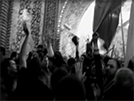Unbridled liberty
- Details
- Hits: 2542
Unbridled liberty is not compatible with belief in an ideology
Constructive and positive iman naturally creates certain obligations and limitations. In human society every ideology has its own rules to which those who believe in it, have to adhere. Even the nihilists who do not accept any system have to observe certain norms and rules. The groups which form clubs to oppose the conventional way of life, do not allow a person conforming to the normal standards, to attend them, because they consider such a thing to militate against their system. If a system of `no system' creates certain duties, how can it be expected that a constructive ideology should involve no moral and legal obligations. The liberal minded section of our society should know that escape from responsibilities is neither in keeping with realism nor with true liberal mindedness.
The iman of childhood despite its purity and serenity is incomplete because it does not originate from consciousness accompanied by an analysis. It is mostly an involuntary response to the environment and is a sort of its echo. That is why it cannot stand its ground in the face of the doubts of adolescence, and as we said earlier, is shaken with the onset of puberty.
The fact is that nothing more than such a simple and superficial iman can be expected during the period of childhood. But during adolescence and the period following it we can have a conscious iman, an iman obtained as the result of calculation, study and deep analysis. The amount of success in obtaining conscious iman varies from individual to individual. In the case of many people the doubt of adolescence is very simple and of limited effect. It little affects most of the questions in which they believed from their childhood.
The iman of such people even in their mature age is more or less a follow up of that which they had during their childhood. It only deepens with the passage of time. Anyhow, it cannot be called a conscious iman. Such people are common even among the highly educated classes. Many an eminent scholar, though outstanding in his own field, has without any critical examination worthy of his learned position, followed the same doctrine or the same political or social policy as was provided to him by his environment. Islam does not approve of this attitude. The highest source of Islam, viz. the Qur'an repeatedly exhorts us to deliberation and logical analysis. It disapproves following a system or a doctrine blindly. It says:
"They say: We found our ancestors following a certain belief and we are guided by their footsteps. Even so we sent not a warner before you (O' Muhammad!) into any township but its luxurious ones said: We found our ancestors following a certain belief and we are following in their footsteps". (Surah al‑Zukhruf, 43:22 ‑ 23).
Again it says:
"When it is said to them: Come to that which Allah has revealed and to the messenger, they say: Enough for us is that wherein we found our ancestors. What! Even though their fathers had no knowledge whatsoever and no guidance". (Surah al‑Maidah, 5:104).
On the question of the adoption of a doctrine the Qur'an emphasizes that iman should be based on knowledge and satisfactory study. If it is not based on knowledge, it has no value and search for truth should be continued.
After adducing certain logical arguments against idol worship, the Qur'an says:
"Most of the unbelievers follow only conjecture in the matter of idol worship. Surely conjecture by no means can take the place of truth. Surely, Allah is aware of what they do" . (SurahYunus, 10:36).
From Qur'anic point of view it is the duty of man that irrespective of the ideas imparted to him by his parents or acquired by him from his environment during his childhood, he should exercise his learning and knowing faculties, to look carefully at himself and the world surrounding him and should continue to contemplate coolly till he arrives at a definite conclusion which may form the basis of his belief and personal and social behavior in life.











